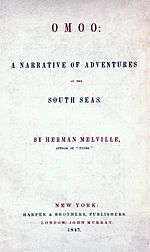- Omoo
-
Omoo 
First edition title pageAuthor(s) Herman Melville Country U.S., Britain Language English Genre(s) Semi-autobiographical novel Publisher John Murray, Harper Brothers Publication date 30 March 1847 Preceded by Typee Followed by Mardi Omoo: A Narrative of the South Seas (pronounced OH-moo) is Herman Melville's sequel to Typee, and, as such, was also autobiographical. After leaving Nuku Hiva, the main character ships aboard a whaling vessel which makes its way to Tahiti, after which there is a mutiny and the majority of the crew are imprisoned on Tahiti. The book follows the actions of the narrator as he explores Tahiti and remarks on their customs and way of life.
The novel was composed in 1846 and published in London and New York in the spring of 1847.
Contents
Background
In the Preface to Omoo Melville claimed to have written the novel "from simple recollection" strengthened by his retelling the story many times before family and friends. Yet a scholar working in the late 1930's discovered that Melville had not simply relied on his memory and went on to reveal a wealth of sources allegedly used in the composition of the novel.[1] Later, Melville scholar Harrison Hayford made a detailed study of these sources and, in the introduction to a 1969 edition of Omoo, summed up the author's practice like this: "He had altered facts and dates, elaborated events, assimilated foreign materials, invented episodes, and dramatized the printed experiences of others as his own. He had not plagiarized, merely, for he had always rewritten and nearly always improved the passages he appropriated." Harrison showed that this was a repetition of a process previously used in Typee "first writing out the narrative based on his recollections and invention, then using source books to pad out the chapters he had already written and to supply the stuff of new chapters that he inserted at various points in the manuscript."[2]
Publication history
The book was published first by John Murray in London on March 30, 1847. In the U.S. a portion was printed on April 24, 1847, in The Literary world, with a complete edition released by the Harper Brothers on May 1 of that year.[3] Murray included both Typee & Omoo in his "Home and Colonial Library" which was marketed and sold as a collection throughout the British Empire. In it Melville was listed together with other well-known writers, an event that turned out to be an important watershed for both his sales and reputation. "Over the decades Melville's presence in the library insured the fame of his first two books with two or three generations of English readers all around the world." [4]
Notes
- ^ Anderson, Charles Roberts (1939). Melville in the South Seas.
- ^ Parker p. 455
- ^ Miller, Perry (1956). The Raven and the Whale: The War of Words and Wits in the Era of Poe and Melville. New York: Harcourt, Brace and Company. pp. 203. ISBN 0-8018-5750-3. http://www.amazon.com/Raven-Whale-Melville-Literary-Scene/dp/0801857503.
- ^ Parker p. 510.
References
Parker, Hershel (1996). Herman Melville: A Biography (Volume 1, 1819-1851). Baltimore, Md.: The Johns Hopkins University Press. ISBN 0-8018-5428-8.
External links
- Omoo: A Narrative of the South Seas Online version.
- Omoo at Project Gutenberg
- Omoo, online at Ye Olde Library
- Free typeset PDF ebook of Omoo and other Melville novels optimized for printing, plus extensive Melville reading list
Works by Herman Melville Novels Typee: A Peep at Polynesian Life (1846) · Omoo: A Narrative of Adventures in the South Seas (1847) · Mardi: And a Voyage Thither (1849) · Redburn: His First Voyage (1849) · White-Jacket, or The World in a Man-of-War (1850) · Moby-Dick, or The Whale (1851) · Pierre: or, The Ambiguities (1852) · Isle of the Cross (ca 1853, lost) · Israel Potter: His Fifty Years of Exile (1856) · The Confidence-Man: His Masquerade (1857) · Billy Budd, Sailor (An Inside Narrative) (1924)Short story
collectionsThe Piazza Tales (1856)Short stories "The Piazza" · "Bartleby, the Scrivener" · "Benito Cereno" · "The Lightning-Rod Man" · "The Encantadas, or Enchanted Isles" · "The Bell-Tower" (all 1856) Uncollected : "Cock-A-Doodle-Doo!" (1853) · "Poor Man's Pudding and Rich Man's Crumbs" (1854) · "The Happy Failure" (1854) · "The Fiddler" (1854) · "Paradise of Bachelors and Tartarus of Maids" (1855) · "Jimmy Rose" (1855) · "The 'Gees" (1856) · "I and My Chimney" (1856) · "The Apple-Tree Table" (1856)
Unpublished in Melville's lifetime : "The Two Temples" · "Daniel Orme"Poetry Battle Pieces and Aspects of the War (1866) · Clarel: A Poem and Pilgrimage in the Holy Land (1876) · John Marr and Other Sailors (1888) · Timoleon (1891) · Weeds and Wildings, and a Rose or Two (1924)
Uncollected/unpublished poems: "Epistle to Daniel Shepherd" · "Inscription for the Slain at Fredericksburgh" · "The Admiral of the White" · "To Tom" · "Suggested by the Ruins of a Mountain-temple in Arcadia" · "Puzzlement" · "The Continents" · "The Dust-Layers" · "A Rail Road Cutting near Alexandria in 1855" · "A Reasonable Constitution" · "Rammon" · "A Ditty of Aristippus" · "In a Nutshell" · "Adieu"Essays Hawthorne and His Mosses (1850)Categories:- 1847 novels
- American novels
- Novels by Herman Melville
- Society Islands
- 19th-century American novels
- Historical novel stubs
Wikimedia Foundation. 2010.
